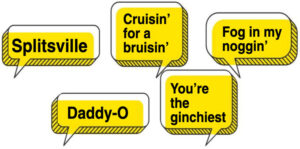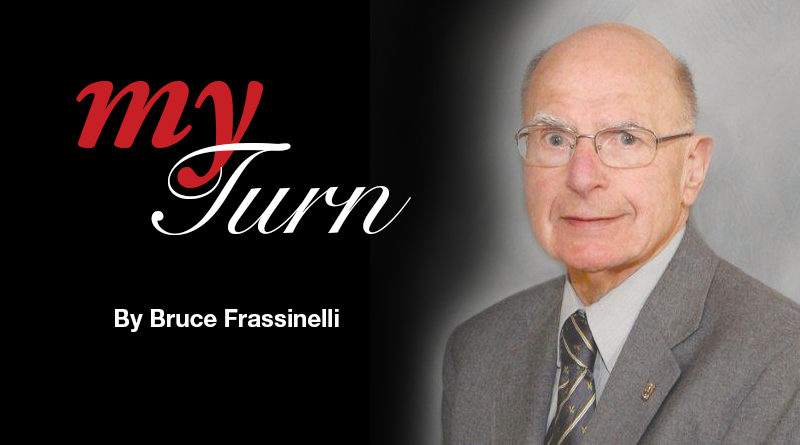‘The Way We Blabbed When I Was a Kid’
By Bruce Frassinelli
Email: bfrassinelli@ptd.net
 Each generation has its own way of speaking. When I was a teenager, we had secret phrases which were intended to baffle our parents and other adults.
Each generation has its own way of speaking. When I was a teenager, we had secret phrases which were intended to baffle our parents and other adults.
Even before that, when I was in kindergarten, I had my school photo taken wearing a T-shirt that featured a drawing of famed drummer Gene Krupa and the phrase “hep cat.” A “hep cat” was someone who was really with it, someone who dug the scene. I doubt whether that was an apt description of 5-year-old Bruce, but, hey, what did I know?
I was reliving some of these words and phrases recently as I began analyzing and comparing some of the comments and shorthand that I see in Facebook and other social media posts — phrases such as “lol” (laugh out loud) or “jk” (just kidding) or “wtf” (I’ll let you figure out that one).
The other day, just as an experiment, I said to one of my granddaughters, “You’re the ginchiest.” (You’re the greatest.) She looked at me oddly, unsure of whether to say “thank you” or “why, what did I do?”
“Baby, you’re the ginchiest” is the catchy phrase popularized by Edd “Kookie” Byrnes on the hit TV show “77 Sunset Strip.” Although he had no singing talent to speak of, Byrnes made a hit record with “Hawaiian Eye” star Connie Stevens, “Kookie, Kookie, Lend Me Your Comb,” which climbed to No. 4 on the Billboard Top 100 chart in 1959 and sold more than 1 million copies.
“Fog in my noggin’,” another phrase from that song, also caught on among my crowd. It means that a person is not thinking straight or can’t remember something.
When my friend, Frank, would exaggerate about his female conquests, my friends and I accused him of “lighting up the tilt meter.” (lying).
I vividly recalled when I came home one night after watching the movie “Blackboard Jungle,” the film that launched Sidney Poitier’s acting career, and called my father “Daddy-O,” he was far from amused, despite not knowing what the term was supposed to mean. I normally referred to him as “pop.”
If a guy had a souped-up hot rod and could make a spectacle of himself by burning rubber on the main drag in town he really had it made in the shade. Today, being in the shade is shielding yourself from the sun and possibly cancer, but “made in the shade” in my day meant that everything was coolsville, not a care in the world.
Two of my era’s superstars — Annette Funicello and Frankie Avalon — starred in a series of beach movies. One of them was called “Beach Blanket Bingo.” This was one of those coded phrases intended to misdirect parents. The phrase is an offshoot of “Back seat bingo,” which is where quite a bit of teen lovemaking occurred. Of course, back then, unlike today, there was enough space in the back seat where stuff could happen.
Although “Beach Blanket Bingo” (1965) showed a lot of female skin, it was chaste by today’s film standards, and I assure you that there was no bingoing going on either under or on top of the beach blankets.
Some of my Italian friends were called “greasers” because of the way they slicked back their hair with hair preparations. This morphed into a pejorative term that took on gangster connotations, most notably references to members of the Mafia, but when the Broadway show, then movie “Grease” became an international phenomenon, “greasers” became much more accepted, especially if they looked like John Travolta.
Here are some of my other favorite ‘50s expressions and their meanings:
• Cruisin’ for a bruisin’ — A person who persists in being a pain or an annoyance and will just not quit or go away.
• Built like a brick shithouse — This is a phrase we would use among us guys in describing a girl’s extraordinary “charms.” I guess you can call it “locker room language.” We might also observe that she was “stacked,” in other words curves in all the right places. If we wanted to compliment a girl directly, however, we would remark about her “classy chassis.” Of course, say stuff like that today will ensure a date with the Me Too court of public opinion for re-educating.
• Keep it up, and you’re gonna get a knuckle sandwich — When a person persists in insulting you and won’t let up even after you’ve asked him politely to stop.
• Chickie-run — The phrase was used in the 1955 movie “Rebel Without A Cause” starring James Dean and Natalie Wood and refers to teen drivers who race toward a cliff at breakneck speed in junker cars. Whoever jumps out first is a “chicken.”
There were plenty of unique terms we used that have fallen by the wayside or have been superseded by more up-to-date, if less colorful, expressions.
We would call the local drive-in theater the “passion pit,” because those fogged up windows did not come from high humidity in the atmosphere but from the passion being expelled inside the vehicle. We had to make sure that we at least noted the name of the motion picture that was playing in case mom or dad asked. It was rare that we ever saw the entire movie. We were too busy doing other things.
If your girlfriend or boyfriend was not very good company on a date, you might ask, “Why are you being such a wet rag?”
If a friend asked why you weren’t going on a date with your girlfriend, it might be because you and she were in Splitsville (broken up).
If a friend was getting overly excited about something, you might tell her, “OK. OK. Don’t have a cow” or “don’t flip your lid” or “don’t spaz out” or “don’t throw a hissy fit.”
Proving that there is an exception to every rule, just once in my life did a girl refer to me as her “dreamboat.”
Here is how I might have described a night of hangin’ with my friends when I was 16 in 1955:
“We cruised the main drag with the top down before going to the flick. Man, it was crazy. Something was pumping, because the fuzz were all over the place. We saw some crazy chicks being handcuffed. I told Paulie, who was driving, to cool it until we passed the scene, then told him to put the pedal to the metal. He was about to ask some dude what all the ruckus was about, but I told him to put a lid on it, because I didn’t want us to be stoolies in case the cops talked to us.”

